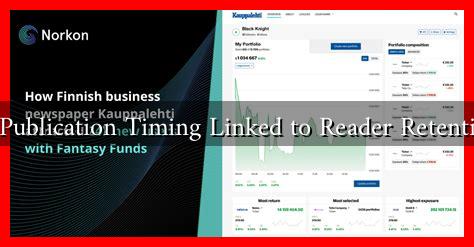-
Table of Contents
Is Publication Timing Linked to Reader Retention?
In the fast-paced world of digital content, the timing of publication can significantly influence reader engagement and retention. As content creators strive to capture and maintain their audience’s attention, understanding the relationship between publication timing and reader retention becomes crucial. This article delves into the factors that affect publication timing, explores its impact on reader retention, and provides actionable insights for content creators.
The Importance of Timing in Content Publication
Timing is a critical element in the content creation process. It encompasses not only the day and time of publication but also the relevance of the content to current events and trends. Here are some key aspects to consider:
- Audience Behavior: Understanding when your target audience is most active online can help maximize visibility. For instance, studies show that social media engagement peaks during specific hours, often during lunch breaks or evenings.
- Seasonal Trends: Certain topics resonate more during specific seasons or events. For example, fitness content tends to gain traction in January when many people set New Year’s resolutions.
- News Cycle: Aligning content with current events can enhance relevance. For instance, a blog post about climate change may gain more traction during a significant environmental event.
Research on Publication Timing and Reader Retention
Several studies have explored the correlation between publication timing and reader retention. A notable study by HubSpot found that blog posts published on Mondays and Thursdays tend to receive higher traffic compared to other days. This suggests that timing can play a pivotal role in attracting initial readership.
Moreover, a case study conducted by CoSchedule revealed that articles published in the morning received more shares and engagement than those published later in the day. This indicates that not only does timing affect initial engagement, but it may also influence long-term retention as readers are more likely to return to content that resonates with them at the right moment.
Strategies for Optimizing Publication Timing
To leverage publication timing for improved reader retention, content creators can adopt several strategies:
- Analyze Audience Insights: Utilize analytics tools to understand when your audience is most active. Platforms like Google Analytics and social media insights can provide valuable data.
- Experiment with Timing: Test different publication times and days to identify patterns in reader engagement. A/B testing can be particularly effective in determining optimal timing.
- Stay Relevant: Keep an eye on trending topics and current events. Tools like Google Trends can help identify what’s currently capturing public interest.
- Utilize Social Media: Promote content at strategic times on social media platforms to drive traffic back to your site. Tailor your posts to align with peak engagement times for each platform.
Case Studies: Success Stories
Several brands have successfully harnessed the power of publication timing to enhance reader retention:
- BuzzFeed: Known for its viral content, BuzzFeed often publishes quizzes and listicles during peak social media hours, resulting in higher shares and repeat visits.
- The New York Times: The publication strategically releases articles during major news events, ensuring that their content is timely and relevant, which keeps readers coming back for more.
Conclusion
In conclusion, the timing of content publication is intricately linked to reader retention. By understanding audience behavior, leveraging analytics, and staying relevant to current trends, content creators can significantly enhance their chances of retaining readers. As the digital landscape continues to evolve, adapting publication strategies to align with timing will be essential for sustained engagement. For more insights on optimizing content strategies, consider exploring resources like HubSpot’s Blog and CoSchedule’s Blog.


